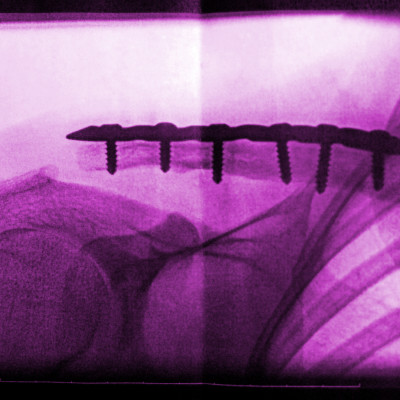
We’ve all seen them happen, if not experienced them first hand. The anatomically impossible angle of a foot in a skate. The breathtaking jolt of a seam opening inside a collarbone. The quiet of the crowd when a skater doesn’t get up from a fall… we shudder to even think about the prospect of a major derby injury. A derby career-threatening, surgery-needing, capital-I Injury. Yet, from tib-fibs to concussions, when the worst has happened, most of us imagine the hardest thing will be not skating, or (far worse) financial hardship from lost days at work. Few people realize in advance what a challenge recovery itself can be. People tend to fall into the extreme ends of the bell curve when injured – either willfully ignoring the severity of the injury, and their own limitations (it doesn’t even hurt guys! I’m going to just walk home from the hospital! I love these drugs!), or wallowing in self-pity over their discomfort and disability. Both are totally understandable! And both are the wrong approach. Adapted from advice my teammate Miss E. Masculator (https://twitter.com/erin_
1) Get off the pain killers.
The sooner you can get yourself off of narcotics, the better. Quitting “cold turkey” allows for a shorter overall detox process, while a slow taper generally makes for less-severe withdrawal symptoms. Write out your schedule or plan for reducing dosage and stick with it. Try to take as little as possible and use other methods of pain control (ice, tylenol, distraction). Set a schedule and try every day to take less than the day before. Cut your pills in half. Take one every four hours, then make it one every six hours, then one every eight. Do whatever you need to do to wean. Once you decide on your last one, don’t take another. Take just one more, and you will go through all of the symptoms for the full period all over again.
2) Take vitamins.
Multiple multi-vitamins. You might not be eating properly due to pain meds, lack of appetite, or apathy, and you need to keep your body as healthy as you can. Try to clear the system of synthetic crap by taking melatonin instead of sleeping pills if you need help getting to sleep. Prioritize all things clean for your body.
3) Water water water.
You need to get more water into your system, to keep the healing process running efficiently. Do you like crystal light? An electrolyte drink? Get a glass of water and force yourself to drink the whole thing every hour or two. Add a squeeze of orange or lemon or even a splash of juice to make it drinkable without adding tons of sugar.
4) Schedule things.
Schedule TV/internet and movie time, and don’t watch more than you’ve set out for yourself. Schedule regular time to get out of the house every day – even if it’s just reading outside or listening to music on the porch. If you can’t read, try listening to music, or podcasts. Magazines can be a better distraction than books sometimes – quick content in small bites. Try not to be in just one spot and just watching TV, which makes anyone feel like hell. Try to schedule going out (away from the house) every few days, even just to the mall or the park. Schedule a visitor every day or two – at the very least this will make you change out of your PJs, but it will also give you something to look forward to.
5) Let people help.
Your team feels *almost* as bad about your injury as you do. Let them do stuff to make themselves feel helpful, even if you’re an independent, fierce, “I GOT THIS AND I DON’T NEED YOUR PITY” kind of lady (amiright?!). Food in your fridge that you don’t have to shop for, or prepare with one arm, is a godsend. Someone to eat it with can be even better. (Helpful teammate hint: frozen casseroles). As per #4, schedule these visits and space them out so they’re not all parading through in week 1 while you’re recovering from surgery and need a TON of rest. When people come by, let someone do your laundry, and ask someone else to take out the recycling for you. Let yourself be taken to someone else’s house for a movie night hangout if you are up to it. You might be a drugged up zombie, and not even realize how much you need a little helping hand, and company. That being said…
5) Try to do things yourself.
It’s the little things that take up time in the day, and when you’re not doing them (getting this and that from here or there) you have more time to just sit around feeling crappy. If you’re on crutches, set up a backpack system so you can carry things (your book, a sweater, groceries, whatever) from one place in the house to another. Duct tape a water bottle holder made for a bike frame to your crutches, and line it with a cloth bag so you can carry things there. Get creative. Make it a game.
6) Get as much exercise as possible.
Clearly you can’t do much right now… but depending on your injury, do what you can. If you’ve busted your foot, maybe you can do core and upper body weights for 10 minutes a day (put it on your schedule!). If you’ve busted your collarbone, just walking around the block for a few minutes will do you good. A caveat: follow doctor’s orders! Stop BEFORE it hurts.
7) Get productive.
If you’re seriously injured and off work for 2-3 months or more, consider taking an online course on a topic you’ve been interested in, learning to draw or play an instrument, getting an accreditation for your career, or otherwise focusing your time and energy into something productive, once you’re past the worst of it and don’t need to sleep all day.
Got more?
I hope you don’t need this post personally, but there’s probably someone in your league or your life who could use this right about now… so pass it on. And let me know in the comments what helped you out the most, if you’ve been the one riding the post-surgical wave. Suggested Distractions (but don’t get caught in an internet rabbit hole! stick to your schedule!): This American Life TED Talks Cuteoverload.com This video from the Crystal Light Aerobics Championships 1987

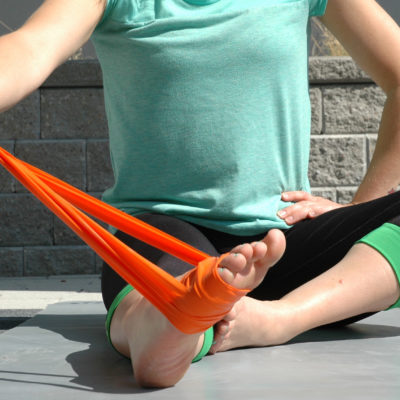 Prehab! Feet and Ankles
Prehab! Feet and Ankles 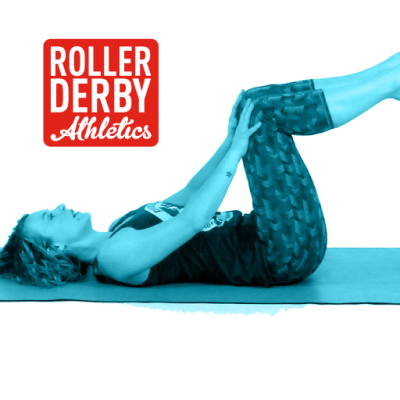 Pre-Hab: How to Engage Your Core
Pre-Hab: How to Engage Your Core 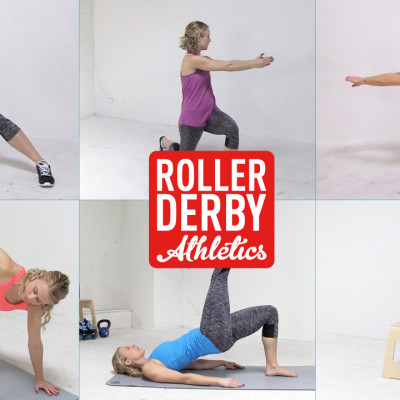 The Top Ten Exercises for Roller Derby Athletes
The Top Ten Exercises for Roller Derby Athletes 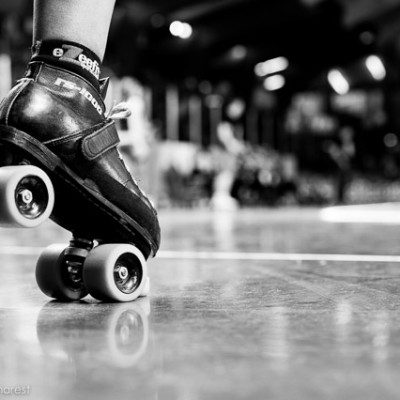 Go From Benchwarmer to MVP with the 1% Secret
Go From Benchwarmer to MVP with the 1% Secret 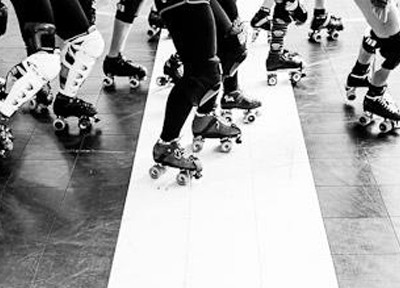 Stop sucking. Start winning.
Stop sucking. Start winning.
Yes to all of this!! I snapped my ankle on 5/13 skating outside and it’s like you’ve been observing what’s working and what’s not during my recovery. I’m vacillating between rock star and whiny butt, but I think a lot of that had to do with the pain meds. If I had known it didn’t hurt that bad, I would have quit them the day after surgery. I had to wait 10 days from ER to OR and stayed doped per the ER doc and everyone around me telling me to “stay ahead of the pain”. It didn’t mix well with my chemistry and I was way more emotional than normal. I have tried to work on core and upper body, but have been sucked in to the TV monster. Trying to break that habit, but just after this next show. ;)
This is fantastic advice that I hope none of your readers need anytime soon.
Oh…and ice has been the best pain killer for me. Cold therapy packs are my jam right now.
I shattered my collarbone last October (the photo above gives me a bit of a flashback, jeepers). So much good advice in here. I didn’t enjoy the painkillers and got off them as fast as I could. I think staying active is the best advice. I was on a strict restriction not to jump or even jog for 3 months, but I made myself hop on a stationary bike/elliptical to keep my legs moving.
I was able to go back to derby less than 4 months after surgery, and I am now stronger than ever, due in part (I think) to making exercise (outside of practice) part of my routine while I was recovering.
Very helpful, thank you! At 51 I broke my ankle in 3 spots (trying my AWESOME new outdoor wheels!). I’d never broken anything before, my Derby Community has been awesome, as have Friends and Family. Great advice for ALL, as far as how best to GIVE and RECEIVE help!
Please add a caveat to getting off the pain meds: take them when you need them, THEN wean yourself off. As a person who had chronic pain /before/ my injury, I found that trying to “tough it out” and “suck it up” was really bad for my physical and mental health. I was anxious, depressed and couldn’t sleep. When I broke my tib/fib, my pain medication was increased, and then when I was ready (after about a month), decreased back to where it was before.
Also, watch that depression! It was really hard, having “athlete” and “skater” integral to my identity; my sense of self took a hit when I was injured. I was really afraid that I would never be the same as before. I recovered, I am going to be okay, but I really had some rough times, there! I’m so glad my teammates were making sure I was okay!
WTH – I appreciate your clarification. You’re right – taking the meds BEFORE you need them / before the pain is too great is for sure important. I think I was thinking more of people who might tend to become complacent and too accustomed to the meds, to their detriment. Thanks for your comments!
Talk…..to coaches, teammates and anyone else that will listen. Get out the wrenching emotions that go with the injury. It helps a lot with the mental side and keeps you sane! And if you feel up to it go watch training, ask for a ride if needed. You are still part of the team and you will learn a lot (and help) just by watching and giving feedback to teammates.